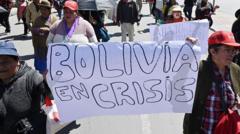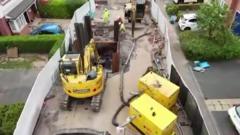Will Economic Struggles Shape Bolivia's Upcoming Elections?

Bolivia's Economic Crisis: A Pre-Election Overview
As Bolivia approaches a pivotal general election, the nation grapples with formidable economic challenges that dominate the political landscape. Citizens, particularly in urban centers like El Alto, are burdened by soaring inflation and dwindling opportunities. The impending election will see the emergence of a new leader tasked with navigating these troubled waters. The economic mess left behind by the outgoing administration poses a daunting challenge for whoever steps into the presidential role.
El Alto: A Microcosm of Bolivia's Struggles
El Alto, Bolivia's second-largest city, is a bustling hub with a population of 1.2 million. Situated at an altitude of 4,150 meters (13,615 feet), it holds the title of the world's highest city with a population exceeding 100,000. The streets are alive with vendors selling everything from fresh oranges to imitation designer sneakers. Amidst this vibrant scene, locals like Josue Macias, a car mechanic, find themselves grappling with the harsh realities of economic instability.
The Impact of Inflation on Daily Life
For many Bolivians, the spike in inflation has become a harsh reality. With the annual inflation rate soaring to 24% as of June, the cost of living has skyrocketed. Josue Macias reflects on the struggles faced by his family, stating, "Prices for everything are going up, but we are still earning the same." Essential items like meat, oil, and eggs have become prohibitively expensive, leading families to tighten their budgets and forgo dining out. The increasing prices have fundamentally altered the fabric of daily life, forcing many to make difficult choices.
Underlying Causes of Economic Woes
The inflation crisis in Bolivia has been fueled by a complex interplay of factors. A significant decline in natural gas production and exports—the cornerstone of Bolivia's economy—has severely limited the government’s ability to generate revenue. This reduction has led to a critical shortage of US dollars, complicating imports of essential goods such as fuel and food. Consequently, the scarcity has resulted in price hikes and street protests across the nation, highlighting the desperation of many citizens.
Fuel Shortages and Long Wait Times
Fuel shortages have become a daily frustration for many Bolivians. Taxi driver Gonzalo Ris shares his experiences navigating the difficult landscape of fuel procurement, stating, "Before it was easy to fill up with petrol. Now I must wait for around four to six hours at the gas pump to get some." The escalating prices have strained his earnings, forcing him to keep fares low to maintain customer loyalty. The government’s historical subsidies for fuel prices have crumbled, leaving citizens to bear the brunt of rising costs.
The Shifting Political Landscape
The political environment in Bolivia is shifting as the election approaches. Outgoing President Luis Arce has placed blame for the economic turmoil on the parliament, accusing them of obstructing essential loans needed for the country’s recovery. Meanwhile, opposition figures highlight Arce’s administration as the source of the ongoing crisis, creating a politically charged atmosphere as candidates prepare to vie for the presidency.
Challenges with Currency and the Black Market
The official exchange rate of Bolivia's currency, the boliviano, complicates matters further. Set at 6.96 bolivianos to one US dollar since 2011, the disparity with the unofficial rate—ranging from 14 to 15 bolivianos per dollar—has fostered a thriving black market. This scenario incentivizes businesses to export products at higher rates rather than selling locally, exacerbating shortages of essential goods within the country. Economist Gary Rodriguez elaborates on this issue, explaining how the difference in pricing encourages businesses to avoid the local market altogether.
Business Struggles and Credit Restrictions
The business community in Bolivia is also feeling the weight of the economic downturn. Restrictions on credit card usage present significant hurdles for entrepreneurs. Alessandra Guglielmi, owner of The Clean Spot, expresses her concerns regarding the limitations imposed by banks on online transactions. "You can only spend around $35 a month over the internet with online purchases. $35 is nothing for a business," she laments. The rising costs of goods have forced her to consider increasing prices, which could further alienate her customer base.
Concerns for the Future
As inflation continues to rise and business operations become increasingly precarious, many Bolivians are hopeful that a new government will usher in a change. Currently, two right-wing candidates are leading the polls: Samuel Doria Medina from the National Unity Front, and Jorge Quiroga from Freedom and Democracy. Both candidates offer contrasting visions for Bolivia's future, as they seek to address the economic crisis that has left citizens in despair.
The Road Ahead: What Can Be Expected?
Political analysts, such as Franklin Pareja, express skepticism regarding the potential for significant improvement in citizens' lives following the election. Many expect the new government to implement structural changes that, while necessary, may face public resistance. Rodriguez argues for a fundamental overhaul of the economic model, suggesting that the emphasis should shift from state control to fostering private sector growth. However, the path to such reforms remains fraught with challenges, and the possibility of swift recovery appears slim.
Conclusion: A Nation at a Crossroads
As the election date approaches, Bolivia stands at a crossroads. The next administration will inherit a series of complex economic issues that demand immediate and effective solutions. Citizens are looking for hope amidst the turmoil, but the reality of structural change may present a difficult pill to swallow. The outcome of this election will be crucial in determining the trajectory of Bolivia's economic future.
Frequently Asked Questions
What are the main causes of Bolivia's economic crisis?
The economic crisis in Bolivia is primarily driven by a decline in natural gas production, high inflation rates, and currency devaluation. These factors have led to shortages of essential goods and rising prices, affecting the standard of living for many citizens.
How is inflation impacting the daily lives of Bolivians?
Inflation in Bolivia has resulted in skyrocketing prices for basic necessities, forcing families to adjust their spending habits. Many are cutting back on dining out and other discretionary spending as they struggle to make ends meet.
What are the political implications of the upcoming election?
The upcoming election is significant as it will determine who will lead Bolivia through its economic recovery. With two right-wing candidates leading the polls, the election results could lead to substantial policy changes aimed at addressing the economic crisis.
What can citizens expect from the new government?
While there is hope for change, many analysts are skeptical about the new government’s ability to quickly improve economic conditions. Structural reforms may be necessary, but their implementation could face significant public resistance.
As Bolivia prepares for a transformative election, the pressing question remains: Will the next president be able to navigate the economic storm and restore hope for a brighter future? #BoliviaElections #EconomicCrisis #FutureOfBolivia
```Published: 2025-08-13 23:40:24 | Category: technology



